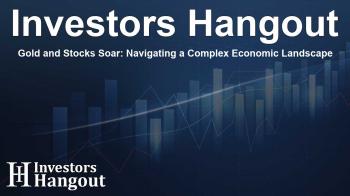Gold and Stocks Soar: Navigating a Complex Economic Landscape

Gold and Stocks: A Rare Occurrence
In a surprising turn of events, Federal Reserve Chair Jerome Powell has delivered expectations-altering insights about the current economic climate, emphasizing there is 'no risk-free path' forward. His comments come amidst an unusual scenario: both gold prices and stock values reaching record highs simultaneously, a situation not commonly seen in economic history.
A Closer Examination of Powell's Speech
Powell's recent address reflects the delicate balance faced by economists as they navigate the maze of inflation and employment indicators. He noted the upward trend in inflation risks while acknowledging the potential downward pressures on employment. This balancing act creates a challenging backdrop for financial markets.
The Economic Puzzle of Simultaneous Rallies
With gold prices soaring past $3,770, a remarkable trend emerges where both gold and equity indices are surging concurrently. Market experts suggest that this rare alignment often indicates conflicting expectations among investors regarding the economic future. When investors express confidence in both asset classes, it raises questions about their underlying economic forecasts.
Understanding Market Contradictions
Analysts highlight this dual growth as an indication of discrepancies within investor logic, signaling a bet on outcomes that are traditionally at odds. While a weaker dollar has had an uplifting effect on gold prices, the anticipation of further Fed rate cuts has given stocks a buoyancy of their own. Yet, Powell's warnings about inflation complications muddy the waters considerably.
Echoes of Historical Financial Bubbles
Adding layers of complexity, there are emerging concerns about recent tech deals, specifically Nvidia's billion-dollar partnership with OpenAI. The structure of this deal is being scrutinized for its similarities to past 'vendor financing' models that characterized the late 1990s tech boom and subsequent bust.
Lessons from the Dot-Com Era
The uncomfortable resemblance to past questionable financing practices raises concerns about current market valuations, especially amid heightened expectations for technological growth in the AI space. The stock market faces mounting pressure from investors eager to see tangible profit increases, which was a challenge during the tech bubble.
The Policy Trap: Fed's Dilemma
Powell's insights into navigating a scenario filled with 'two-sided risks' reveal the Fed’s constrained policy environment. Historically, such settings often lead to increased market volatility as decision-makers grapple with the intrusive nature of inflation against unemployment risks.
Market Signals and Contradictions
The latest economic indicators add another layer of ambiguity. With recent manufacturing and services PMI data reflecting underwhelming performance, investors must confront contrasting signals that complicate future projections for Fed policies.
Implications for Investors
For investors, the simultaneous rise in traditionally opposing asset classes offers a critical moment for introspection. Are the markets expressing unwavering faith in the Fed's policy-making capabilities, or is this a warning sign of a significant impending correction? Observations throughout financial history suggest that simultaneous upticks in gold and stocks could foreshadow impending regime shifts in market dynamics.
Critical Questions Forward
Given the complexity and potential risks laid out by Powell, one pressing question remains: Are we witnessing strategic management of unprecedented economic trials, or are we on the verge of a market correction as unrealistic forecasting meets reality? The unfolding landscape presents pivotal cues for investors, requiring vigilance and analytical foresight in portfolio management.
Frequently Asked Questions
What sparked the simultaneous rise in gold and stocks?
The unusual phenomena followed Powell's remarks on economic challenges coupled with expectations surrounding inflation and interest rates.
How do Powell's comments impact investor confidence?
Powell's insights reveal a complicated landscape, likely leading investors to reassess their strategies regarding asset classes.
What historical patterns are echoed in today's markets?
Recent developments draw comparisons to past market behaviors, especially during periods of economic transition like the dot-com bubble.
What should investors focus on amid market highs?
Investors should remain aware of conflicting signals in the economic landscape that could forecast future volatility and corrections.
What does this mean for future financial policy?
Powell's acknowledgment of significant risks signals that future financial policies may be reactive to evolving economic conditions and investor sentiment.
About The Author
Contact Dominic Sanders privately here. Or send an email with ATTN: Dominic Sanders as the subject to contact@investorshangout.com.
About Investors Hangout
Investors Hangout is a leading online stock forum for financial discussion and learning, offering a wide range of free tools and resources. It draws in traders of all levels, who exchange market knowledge, investigate trading tactics, and keep an eye on industry developments in real time. Featuring financial articles, stock message boards, quotes, charts, company profiles, and live news updates. Through cooperative learning and a wealth of informational resources, it helps users from novices creating their first portfolios to experts honing their techniques. Join Investors Hangout today: https://investorshangout.com/
The content of this article is based on factual, publicly available information and does not represent legal, financial, or investment advice. Investors Hangout does not offer financial advice, and the author is not a licensed financial advisor. Consult a qualified advisor before making any financial or investment decisions based on this article. This article should not be considered advice to purchase, sell, or hold any securities or other investments. If any of the material provided here is inaccurate, please contact us for corrections.

